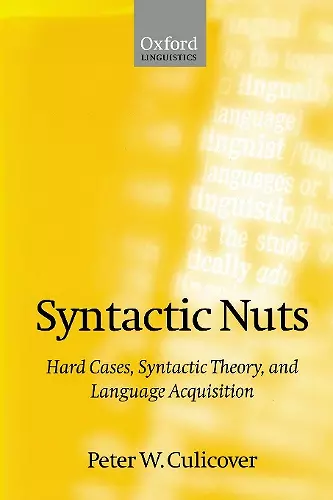Syntactic Nuts
Hard Cases, Syntactic Theory, and Language Acquisition
Format:Hardback
Publisher:Oxford University Press
Published:2nd Sep '99
Currently unavailable, and unfortunately no date known when it will be back
This hardback is available in another edition too:
- Paperback£59.00(9780198700234)

This book investigates the architecture of the language faculty by considering what the properties of language reveal about the mental abilities and processes involved in language acquisition. The language faculty, the author argues, must be able not only to accommodate what is general, exceptionless, and universal in language, but must also be capable of dealing with what is irregular, exceptional, and idiosyncratic. In Syntactic Nuts Peter Culicover shows that this is true not only of the lexicon, but for syntax. Marginal and exceptional cases, where there is no straightforward form-meaning correspondence, are dealt with by the language faculty easily and precisely as the general cases. In considering how and why this should be the author argues against the prevailing trend in generative grammar, which takes the learner as either incorporating maximally global generalisations as part of its innate capacity for language, or projecting global generalisations from a very limited input on the basis of innate mechanisms. He suggests that the learning mechanism does not generalize significantly beyond the evidence presented to it, and further that it seeks to form generalizations based on all and only the evidence presented to it. Syntactic Nuts makes a fundamental contribution to generative grammar and syntactic theory. It situates syntactic theory within cognitive science in a novel way. It contributes to an alternative, and yet in many ways traditional, perspective on the manner in which knowledge is represented and processed in the mind.
Culicover addresses the fundamental question of the nature of syntactic universals and the related issue of how syntactic knowledge is acquired by children. His answer challenges many mainstream generative conceptions in taking to a new and higher level the debate over the relative balance between innateness and learning. The fact that his conclusions are supported by dozens of meticulously argued analyses of diverse syntactic phenomena gives his conclusions a credibility that has heretofore been missing in critiques of parametric approaches to universal grammar * Frederick Newmeyer, University of Washington *
The reigning orthodoxy in generative linguistics has it that syntax can be divided into a fully systematic core and an eccentric periphery. The former is claimed to be learnable by virtue of a finite parameterization; the learnability of the latter is rarely discussed, but taken to be relatively haphazard. In this new book, Peter Culicover, one of the early pioneers of learnability theory, has thrown a monkeywrench into the works. He demonstrates that there is in fact no sharp line between core and periphery, that there cannot be a finite parameterization of the core, and that any learning theory capable of accounting for the peculiarities of the periphery can also account for the core's systematicity, given the systematicity of semantics. * Ray Jackendoff, Brandeis University *
Along the way, Culicover provides an entertaining tour through many of the uncharted byways of the peripheral syntax of English and other languages. He grounds his approach in a careful analysis of language learnability, and in so doing urges both syntacticians and neuroscientists toward a more responsible rapprochement in dealing with the complexities of human language. * Ray Jackendoff, Brandeis University *
ISBN: 9780198700241
Dimensions: 242mm x 163mm x 19mm
Weight: 518g
256 pages